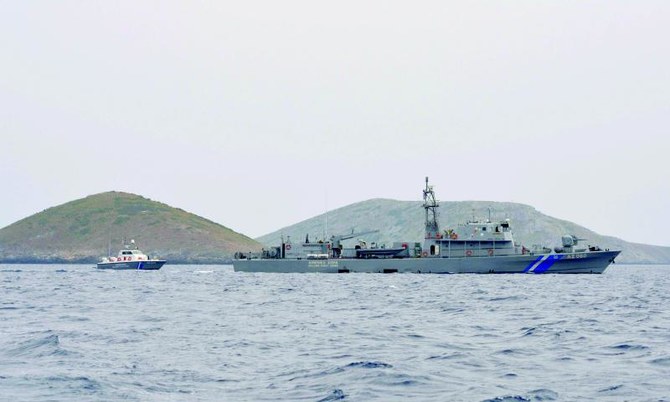Tension is rising between Turkiye and Greece
Tension is rising between Turkiye and Greece

Both Turkiye and Greece are on the threshold of important elections and are therefore using a sharpened discourse against each other.
High-level officials from Turkiye, Germany and Greece met on Dec. 16 in Brussels in an attempt to smoothen the atmosphere. A German government spokesman said Berlin was eager to ease the tensions between these two countries and that both the Turkish and Greek governments had responded positively to the German initiative. However, in the heat of the preelection atmosphere, these positions may derail at any moment.
Greece heightened the tone of its anti-Turkish rhetoric and provoked Turkish President Recep Tayyip Erdogan into increasing the bidding. Foreign Minister Mevlut Cavusoglu responded by stating that if Greece’s provocative acts continue, “Turkiye might open the file of the sovereignty of the Aegean islands close to the Turkish coast,” because these islands were transferred to Greece on condition that they would be kept demilitarized.
In 1976, increasing tension between Ankara and Athens was defused thanks to the UK’s efforts. That agreement was later transformed into UN Security Council Resolution 395. This resolution invited Turkiye and Greece to avoid unilateral action and solve the problem of the continental shelf, which was one of the contentious issues between them. Turkiye and Greece also signed, again in 1976, a memorandum in Bern, Switzerland, committing themselves to avoiding unilateral action in the Aegean.
The tension increased again in 1987, when Greece carried out seismic research beyond the territorial waters of the Greek island of Thasos. In 1996, yet more tension broke out because of the disputed identity of the uninhabited islets of Imia, but the Bern memorandum was applied and any deterioration of the crisis was avoided. The US was instrumental in soothing the tensions.
Cavusoglu’s visit to Washington this month demonstrated that the US is no longer interested in playing such a balancing role. On the contrary, it displays a strong bias in favor of Greece on all subjects between Ankara and Athens.
Ankara may again turn to Germany for a role in appeasing Turkish-Greek tensions but, this time, Greece’s EU membership would weigh on the other side of the scale because an EU member state is not expected to side with a non-EU state. So, even if Germany wants to help Turkiye, its support is bound to be lame. Germany may be expecting from Ankara a more committed attitude against Russia and to join the NATO sanctions. But Turkiye does not seem to be ready to distance itself from Moscow.
The demilitarized status of the Aegean islands close to the Turkish coast is a serious source of contention between the two countries. These islands were given demilitarized status in 1913 at the time of their transfer to Greece. No other agreement has been signed in the meantime to change this status. As for the Greek Dodecanese archipelago, it was placed under the same demilitarized status. This archipelago was later occupied by Italy, but this did not change the demilitarized status of the islands. When they were returned to Greece after the Paris Treaty of 1947, the demilitarized status remained intact.
The guiding principle in making these islands demilitarized was that they were threatening Turkiye’s national security. The occupation of these islands by Italy and their return to Greek sovereignty did not change the basic rule that they constitute a threat to Turkiye’s security. Greece claims that this transfer of sovereignty allowed it to remilitarize the islands. It also claims that the military installations constructed on these islands should not be perceived as military infrastructure.
The demilitarized status of the Aegean islands close to the Turkish coast is a serious source of contention.
Yasar Yakis
The act of putting an island in demilitarized status is done through international agreements. This status can be changed only by another international agreement. In the case of the Dodecanese islands, there is no international agreement that has modified this status. Therefore, the islands continue to remain demilitarized.
Another crucial issue between Turkiye and Greece is Athens’ intention to increase the width of its territorial waters from six miles to 12. The Turkish parliament has decided that, if Greece takes such a step, Ankara will consider this a casus belli. The reason for this is that the territorial waters of the Greek islands in the Aegean Sea constitute at present 40 percent of the area. If it were to increase the width of its territorial waters to 12 miles, it would control 70 percent of the area of the Aegean and Turkiye’s share would go down from 51 percent to 19 percent. Furthermore, Turkiye’s share of territorial waters would be reduced to 10 percent. Ankara would not accept being strangulated to that extent.
We will have to wait and see whether the elections in both countries will help ease today’s tensions.
- Yasar Yakis is a former foreign minister of Turkiye and founding member of the ruling AK Party. Twitter: @yakis_yasar
Disclaimer: Views expressed by writers in this section are their own and do not necessarily reflect Arab News’ point of view




